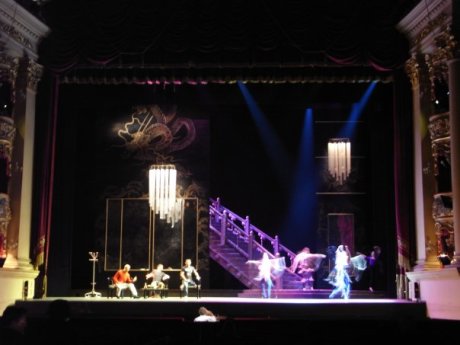Rossini’s “La Scala di Seta”: meet the players
June 8, 2009
 My Blog has moved to www.albertcombrink.com
My Blog has moved to www.albertcombrink.com
I have been a repetiteur for many productions, from Operas to Musicals to Cabarets. But I have enjoyed few of them as much as this production conducted by Alex Fokkens and directed by Lara Bye. The story is delightfully funny and charming. A young couple are in love and already secretly married, and this becomes the engine that drives the farce. I think it is a real “Closet-Opera”: there is always at least one closet on the stage, with always at least one person hiding in it, about to hide in it, or who has just come out from hiding in it. It is a lovely excuse for some comic bussiness and delightful Bel Canto music with exhilirating runs, high notes, cadenzas and furious finales. The work itself is a pleasure, Rossini’s 5th opera, the work of a twenty year old. Musch of the mature Rossinian genius is already to be found. Team leaders Alexander Fokkens and Lara Bye created a production bubbling with life, humour and energy.
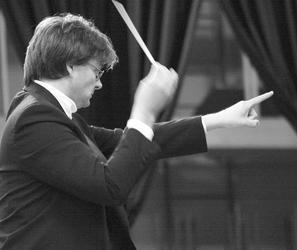
Conductor Alexander Fokkens
Alex Fokkens uses a light touch on the score. The orchestration had to be reduced for this production and the Cape Town Camerata certainly has their work cut out for them. Alex understands voices well and it is evident that he has studied singing himself. The skill he brings to conducting Rossini is the ability to keep things “light and frothy” but not “frothy and frivolous”. He has a way of insisitng on what he wants, musically, while keeping the mood positive and creative. His experience as an opera conducor certainly pays off in the devellish ensembles as much as in the slow arias, where a misjudgment of tempo could be fatal. I appreciated all his discussions with the cast about expressive detail. The atmosphere of exploration and discovery was one to treasure.

Director Lara Bye
Lara Bye is so refreshing to work with. Willing to think “outside the box”, she rethinks operatic conventions and came up with a classic comedy that has a very contemporary feel to it. Her eye for comic timing is excellent and she has the ability to keep everybody focussed on what she is trying to communcate to an audience, while keeping the mood light enough for all the cast members to feel relaxed enough to make their own contributions. I felt asif I was watching a growth process in which the joy and fun of Rossini’s opera revealed itself in stages, a series of discoveries. Multimedia elements, animations and projections by Jon Keevy adds to the comedy and freshness of the production. The off-beat production had audiences of all ages laughing and giggling at its first public outing in February. Packed houses enjoying an afternoon of Opera? How delightful!
I very much enjoyed working with the cast. The two Baritones Aubrey Lodewyk and Conroy Scott both have very striking stage-personalities and the voices to match.
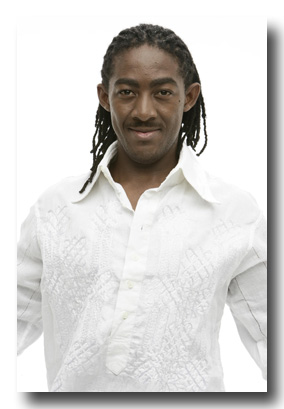
Baritone Aubrey Lodewyk
Conroy Scott – who also plays the Double Bass professionally – is given the role of Blanzac, whose overconfidence and fall from grace, is plotted and portrayed with excellent comic timing. I enjoyed his awareness of what the basses would be playing at any given moment in the opera. Even in this early Rossini opera, the trademark harmonic drive is evident, and Conroy’s orchestral experience creates a sense of being very aware of and in tune with whatever is happening in the orchestra pit. There’s a sense of youth, energy and enjoyment about being in rehearsal with Conroy that I enjoyed.
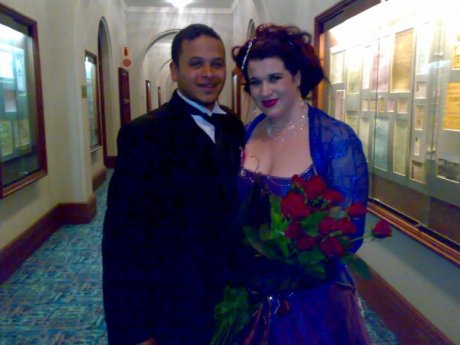
Conroy Scott and Zanne Stapelberg: Die Burger Gala Concert Feb. 2009

Magdalene Minnaar "La Scala di Seta" 2009
Magdalene Minnaar has a wonderfully expressive colloratura. Working with her on runs and cadenzas is truly fun. She has an excellent ear and faultless intonation – from many years of music lessons and performing also as a violinist, no doubt. And if one suggests just one more high note, or one more tricky little hairpin bend on some ridiculously high note, she is not only willing to try it, but can actually pull it off! I really enjoy her willingness to find a dramtic reason for a cadenza, and to let the music guide the movements to go with the notes. She will be fitting in this production on her way to New York for Masterclasses.

Elizabeth Frandsen
Elizabeth Frandzen sings the role of Lucilla with the perfect mixture of comedy, irony, and a touch of the “Adams Family”. Her popping in and out of the closet is one of the highlights of the evening, and her seduction of Blanzac is delightfully funny. Her powerful mezzo can be brandished like a sword to subdue a cocky baritone, or like a ticklish little feather to seduce the man of her dreams. Her aria is one of the highlights of the show and it is very hard to leave the reharsal room without whistling her perky little tune.

Sunnyboy Dladla in Verona, Italy 2009
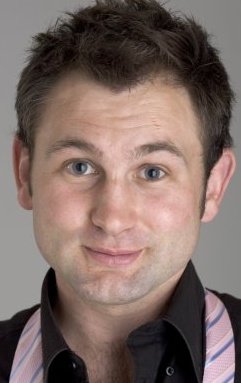
Jacques Louw
Jacques Louw sings the tutor Dormont. A character role, he tends to pop up at inconvenient times and in even more inconvenient places.
The project is presented under the auspices of the South African Wagner Society and coordinated by Music Maestro’s
“La Scala di Seta” – Synopsis
June 7, 2009

January 2009: Artscape Theatre
My Blog has moved to www.albertcombrink.com
Catch “La Scala di Seta” 12 and 13 June 2009 at Atrscape Theatre

Synopsis
Dormont is the teacher and guardian of the beautiful Giulia, and he is determined that she will marry Blansac despite her continual rejection of his advances. The fact is that Giulia is already married to Blansac’s friend Dorvil, who every night is able to exercise his conjugal rights because Giulia lowers a ladder made of silk down to him from her bedroom window.
The opera opens in the morning. Owing to the attentions of Giulia’s cousin Lucilla, and the family servant, Germano, Dorvil has great difficulty making his escape by his usual method. Blansac is due to arrive at any minute in his quest for win Giulia’s love, but she has devised a scheme to divert his amorous attentions towards her cousin, who would make an excellent wife for him.
Giulia intends to bring Lucilla and Blansac together, and persuades Germano to spy on them from a secret hiding place to see how the relationship develops. Blansac arrives with his good friend Dorvil, who desperately tries to persuade him that Giulia is not looking for a husband. Unfortunately this only has the effect of making Blansac more determined, and more confident of success. He suggests that Dorvil might care to hide and see how successfully he is able to woo Giulia. Consequently, when Giulia enters, her meeting with Blansac is being overhead by both Germano and by her husband.
Giulia decides to probe Blansac to see if he would make a good and faithful husband for her cousin. Her questioning deceives all of the men listening into thinking that she is genuinely interested in Blansac. Dorvil emerges from hiding and storms off in fury, much to Germano’s surprise, who also shows himself. In the midst of all the confusion and noise Lucilla enters and Blansac suddenly notices what a fine looking young woman she is. Decidedly prettier than her cousin Giulia.
It is now late evening. Giulia is desperate for Dorvil to arrive so that she can explain the reason why she was questioning Blansac so closely about marriage. Once again the servant Germano is on hand and realizes that his mistress has an assignation. He can only assume that it is with Blansac, and decides to hide once more and see what happens. Unfortunately he is unable to keep his secret to himself and he lets Lucilla in on it. She is distressed to learn that Blansac, who she now loves dearly, is meeting Giulia and she also determines to find a hiding place in Giulia’s bedroom to observe proceedings.
There is general surprise and joyful amazement when it is Dorvil who climbs into the bedroom, followed closely by his friend who is intent on using the silken ladder to further his wooing, not of Giulia, but Lucilla. Everyone scatters when Dormont, who has been woken by all the noise, enters in his nightshirt. Seeing the way that everything has turned out for the best, he quickly forgives the couples for their underhand behavior and all ends in general rejoicing.

